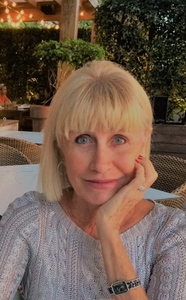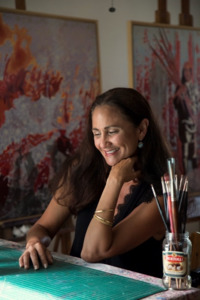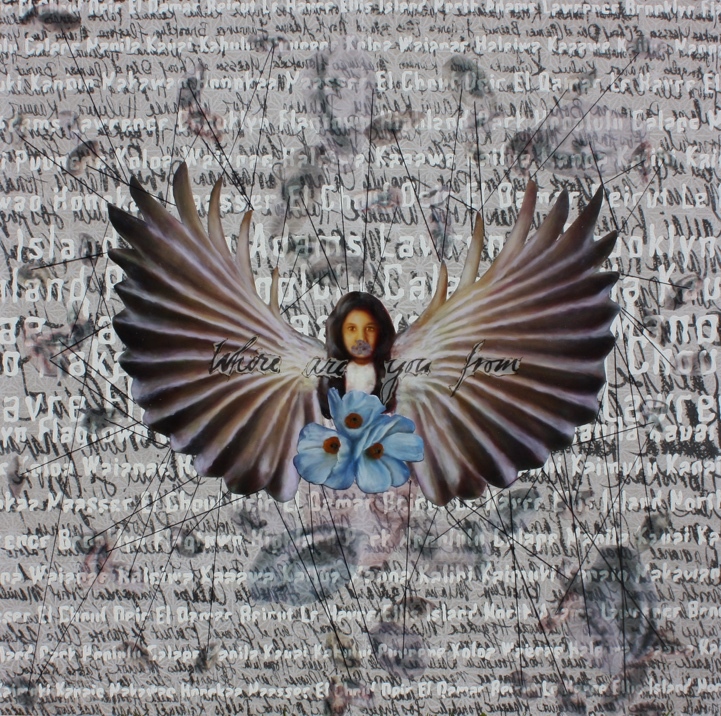Poetry and Medicine
Fire from the Sky and Heart Work
Edited by Lucius Lampton, MD; JMSMA Editor; Poetry by Adele Ne Jame; Art by Melissa Chimera
This month, I offer a lovely poem, the fifth in a series, by Adele Ne Jame, a first-generation Lebanese American who has lived in Hawai’i since 1969. She has written extensively about Hawai’i and Lebanon in her poetry collections, including Field Work, The South Wind, Poems, Land and Spirit, and in her new manuscript, First Night at the Beirut Commodore and Other Poems. She has taught poetry at the university level in Hawai’i since 1986, and she has served as the Poet-in-Residence at the University of Wisconsin-Madison. Her work has been published in journals such as the Georgetown Review, Ploughshares, Atlanta Review, Nimrod, the Denver Quarterly, Poetry Kanto, and the Notre Dame Review. Her many awards include a National Endowment for the Arts in Poetry, a Pablo Neruda Poetry Prize, a Robinson Jeffers Tor House Prize and an Eliot Cades Award for Literature. Her poems have been exhibited as broadsides at the Sharjah/ Dubai International Biennial, UAE and at the Arab American National Museum, Dearborn, Michigan. She and her artist daughter, Melissa Chimera, served as the 2022 Mikhail Series Lecturers at the University of Toledo.
To introduce this poem “Fire from the Sky and Heart Work”, Adele relates:
"I am again honored to respond to the request to offer an introduction to ‘Fire from the Sky, and Heart Work.’ While I prefer to allow the poems to speak for themselves, I will offer some thoughts about what inspired this poem and my work in general. Robert Frost once spoke about his work saying that a ‘poem begins with a lump in the throat,’ and the great English poet, William Wordsworth defines poetry as ‘the spontaneous overflow of emotions recollected in tranquility.’ This idea goes along with Cezanne’s notion that when creating a work of art, time is nothing—all is gestation. In fact, he often thought he failed in his effort to approximate his vision of the work with what he produced on the canvas for he repeatedly slashed his canvases and broke his brushes in frustration. Many others have talked about the essential hard, blue-collar work of learning the craft, as it is the vehicle that delivers a work of art alive into the world so that it reaches others. Walt Whitman in his fine metaphorical poem, ‘A Noiseless, Patient Spider’ speaks of this when he says the spider launches forth, ‘filament, filament, filament’ out of itself seeking spheres to connect them until a bridge is created ‘till the gossamer thread you fling catch somewhere, O my soul.’ That is to say, the words of a poem and its impact create a bridge between the heart and mind of one person that reaches the heart and the mind of another.
"So, it is this alchemy of elements and the inspiration of the events in our daily lives and that of others ‘recollected in tranquility’ along with a gestation period which allows the writer to exercise control over charged subject matter so that a poem can be delivered alive into the world. I could talk on and on about that blue collar work of poetically manipulating language using image, metaphor, compression, silence—when to allow it, the composite force that mysteriously enters the writing, where the imagination goes off into unexpected, seemingly unrelated directions, one that delves into the mysterious connections that provides both depth and luminosity in the work while always keeping in mind the injunction Ezra Pound, and Confucius before him, put forth to ‘make it new’ so that what we always knew in our hearts strikes us again on the page—suddenly and powerfully.
"So, poetry at its best is not mere entertainment, though it must be pleasing to our senses—all of them. At its best, it is about those few great themes that persist in life: love, death, sex, truth and beauty (an echo of John Keats). But it does not rely on ‘facts.’ In fact, Jack Gilbert, an icon of American poetry, wrote a poem called, ‘Poetry Is a Kind of Lying,’ suggesting that only by inventing content, details in the work will we get at the emotional truth we wish to share. So, trying to decipher what actually happened verses what was imagined or invented in a poem is a meaningless endeavor.
"Having said that, of course this poem is about death, both death and love and that necessary heart work that enlarges life. James and my mother (unlike the lines in my poem) both died within months of each other. I had no idea when I began this poem that the loss of my mother would come to inhabit it, but a writer must allow the work to go where it will and have faith that some kind of underlying, profound cohesion will prevail. This letting go, while at the same time controlling the poem, allowing the mystery of it to flourish though there may not be any logical, rational connection, is an act of faith that a writer must recognize and honor. So, this poem begins with the routine of weekly visits to see James and finally with his death, and moves into echoes of my mother’s death. In time, with James, I began to realize that it was an honor and a privilege to spend those many months with him, especially given thousands of miles of distance that prevented me from being as close to my mother in her final days as I had wished. Losing them, losing the light of their lives, was/is still painful. But, feeling the loss as well as the pain of our own limitations and failings is a valuable experience. It keeps us humble and facilitates a deeper connection with others both in life and after. Wordsworth’s beautiful poem, ‘We Are Seven’ where the speaker in the poem talks to a little girl at her siblings’ gravesite is another life-affirming poetic example. She insists that though her two siblings are dead, they are still part of her family. She continues to insist, ‘we are seven,’ thus rejecting logic in favor of the truth of her abiding emotion. I’m sure this resonates for all of us who have lost dear ones, yet we feel their presence around us all the time.
"Acknowledging that we all stand on the shoulders of those who came before us, I have to admit that I also thought of Theodore Roethke’s famous poem, ‘Elegy for Jane, My Student Thrown by a Horse.’ Feeling powerless that he cannot wake up Jane, he says ‘Over this damp grave, I speak the words of my love:/ I with no rights in this matter/ neither father nor lover.’ But the weight and the truth of this poem suggests, in some sense, he was both. Later in my poem, I refer to James, as ‘my James.’ This is an intimate expression, a risky phrase of authentic love that I felt for him. And, I often think of the gift of Richard Blessings poems. He was Director of Creative Writing at the University of Washington who when young died of brain cancer. He wrote a number of elegies for himself. One in particular, ‘At the Ballard Locks,’ is an extended metaphor in which he compares his own journey to that of the salmon at the Ballard Locks who spawn then die. These kinds of poems have lasting power. They show us anew what it is to be human, to suffer, to live in strength and with dignity, to be present in the moment, to look for those daily occasions when we can open our hearts to another.
"In this way, death is no impediment to the heart’s expansion and healing. This is one of the reasons that I am deeply honored to present my work in this journal, sharing it with physicians who help others in such immediate and tangible ways as they do also with their healing expressions of empathy and kindness.
“As an afterword, for James, I was honored to work with the university to publish his poem, ‘Kamikaze’ as a broadside and, for many years, to judge a student poetry contest created in his name, as he wished. It is touching to know that his heartfelt generosity and his vision, long after his passing, encouraged other students to pursue their desire to be writers, to fling their own gossamer threads out into the world hoping they will catch somewhere.”
Melissa’s painting which accompanies this poem is entitled Where Are You From (2018, oil, silk and ink on linen | 48 in x 48 in). In regard to her painting, artist Melissa comments, “It’s my self-portrait as a child in which I imagine all of the places we have ever lived and the eyes of ancestors floating in space and time above both the living and the dead.”
Born and raised in Hawai’i, Melissa Chimera is a conservationist whose work consists of research-based investigations into species extinction, globalization and human migration. She has exhibited throughout the U.S., Asia, and the Middle East with solo and curatorial projects, and her work is included in the collections of the Honolulu Museum of Arts and the Arab American National Museum. She is the recipient of the Catherine E. B. Cox Award, finalist for the Duke University Lange-Taylor Prize and was Anchorage Museum’s 2022 Artist-in-Residence and the University of Toledo’s Endowment grantee for her work concerning immigrant narratives.
“Fire from the Sky and Heart Work” was first published: Rusted Radishes, Beirut Literary and Art Journal (2023). The editorial assistance of Cathy Chance Harvey, PhD, of Tylertown, in the preparation of this poem is gratefully acknowledged. Physicians are invited to submit poems for publication in the Journal either by email at drluciuslampton@gmail.com or regular mail to the Journal, attention: Dr. Lampton.—Ed.
Fire from the Sky and Heart Work
for my student James
The sky darkens as I sit with him at Tripler,
the pink hospital on Red Hill—
old man, both legs gone above the knee,
not long here for us. Outside
his window the light turns indigo as
the sun moves west toward the sea,
while his books are stacked in the
filtered light on his bedside table—
Eliot, Pound, Jeffers, Gibran, the Bible.
I last saw him a decade ago,
not long after I lost my mother
thousands of miles away from
our island in the Pacific. Even then
when he entered my classroom,
he was an old man, trimmed, white beard,
loud laugh and cold blue eyes,
a pack of his poems stuck in his back pocket.
Years later, when the call came
from the dean’s office urging me
to see him, an endowment on the line,
that I never much liked his poetry,
only tolerated his tortured lines—
that was of no account.
So, the first Tuesday—of a year Tuesdays,
my heart was pumping hard when
I walked into his room— but James,
same as ever, called out to me,
shouting my classroom mantra and gently
laughing: no archaic language, please!
but it cut to the quick.
Still, I wanted no part of the dying then—
I had not yet learned this thing
about the human heart—that embracing pain
is the only way to survive it.
Even with my grandmother’s story of
her father going to his beloved’s grave
in his village, the Monastery of the Moon,
unsealing her casket in the night
to hold her in his arms again,
which, when young, I steadfastly refused
to believe. But who knows
what really happens in the Chouf villages
where people still believe in miracles.
During the months I visited him,
each week driving west into H-1 gridlock,
I began to see the pink building on the hill as
an oasis, the afternoon light
working off the mountains, making
the glow of it otherworldly.
I would bring ripe papayas and chocolate,
and he would ask me to read to him—
sometimes Eliot, sometimes the Bible.
Some days he would tell me about his women,
his five marriages, yes five, with beautiful,
exotic women, he said, one from Sumatra,
and another from the Marquesas
with full hips and black hair,
the music of the islands still in his eyes
when he said their names.
Sometimes it was his years in the navy,
WWII, all that carnage, how one day
he looked up into the open sky
from the deck of the Indianapolis and saw
a kamikaze flashing like sunlit mercury
barreling straight down for him—
fire out of the blue—diving from the sky,
he would say. How after years of recovery,
he turned to missionary work in Indonesia,
talking scripture like a master.
He was, as Kafka said, a cage looking for a bird.
I could not stop seeing him,
but I knew the next phase was coming fast
when I first saw fear starting to darken his face.
The last time I saw him, the dreaded
ask came to read Job 38,
where the suffering mortal, angry
and in agony –questions the Lord,
where the Lord interrogates the man
with questions that eviscerate him.
My heart blown open by then,
my James knew every word verbatim,
the unknowable, the unfathomable
confounding us both. Then for the first time,
looking square into my eyes,
he asked me to hold his hand—
the room began spinning a cobalt blue—
just for a minute, he said,
and in a moment of strange alchemy,
as if my spirit left my body,
I was neither here nor there.
Rather, I was holding my mother’s hand
her breathing labored, when her sharp words
repeated to me as a young child:
your father always spoils you rotten—
in that moment of grace—vanished
and a turbulent love hovered
over us all in that room, in that light.
When the call from staff came at 4AM,
to identify him, I had been dreaming.
I was in mother’s room—the cold
California sun was no longer streaming
through her windows. I had covered her
with a blanket, but the air had gone thin,
and the sky—I remembered looking out—
was impossibly blue and thunderous until
the last remnants of all that earthly
fire-light went irretrievably dark.
—Adele Ne Jame
Honolulu, Hawai’i






